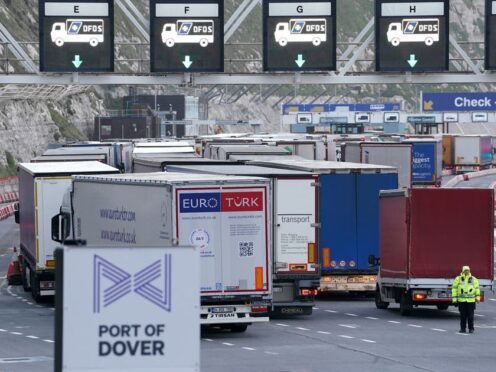
Food suppliers have warned of higher prices and empty supermarket shelves thanks to a new post-Brexit border charge being introduced at the end of the month.
Importers will have to pay up to £145 to bring small amounts of products such as cheese, salami and fish through the port of Dover or the Eurotunnel from April 30, according to guidance published on Wednesday.
The fee is intended to cover the cost of operating the border control posts introduced after Brexit, and will not apply to goods brought into the UK for personal use.
But importers warned the new charges could lead to higher prices for consumers.

The Cold Chain Federation’s chief executive, Phil Pluck, said: “Ultimately, this will increase business costs and food prices and potentially lower choices for the shopper.”
Mr Pluck added it was “extremely disappointing” that the charges had been announced “at the last minute”, leaving businesses with little time to make any necessary changes.
He said: “This is in no way helpful to UK-based importers and the whole EU supply chain. It reinforces the Government’s slapdash approach to a vital part of UK PLC.”
James Barnes, chairman of the Horticultural Trades Association, said Wednesday’s announcement “confirms our fears that in just one month, UK horticulture’s competitiveness will be again hit by a cost hike for no material gain”.
Adding that the policy “feels like it is constructed on the back of an envelope at best”, Mr Barnes warned that the charges would “undoubtedly increase costs” and increase the likelihood of empty shelves in supermarkets.
Labour shadow minister Nick Thomas-Symonds said: “British shoppers and businesses already suffering with the Conservative cost-of-living crisis will – rightly – be deeply worried about prices being driven up yet again.
“Labour has warned about the impact of these measures and the potential for chaos with new border checks. With less than a month before their introduction, we know know what the costs will be.
“Labour has a plan to reduce costly bureaucracy, through seeking to negotiate a veterinary agreement with the EU to massively reduce the need for checks, helping make food cheaper and our businesses more competitive.”
The fee will be charged per type of product imported, and will vary from £10 to £29 depending on the risk products present. It will also be capped at £145 for mixed consignments.
A Government spokesperson said this was “within and at the bottom end of the range which we consulted with industry on”.
They added: “The charge is designed to recover the costs of operating our world-class border facilities where essential biosecurity checks will protect our food supply, farmers and environment against costly disease outbreaks entering the UK through the short straits.
“The charges follow extensive consultation with industry and a cap has been set specifically to help smaller businesses.
“We are committed to supporting businesses of all sizes and across all sectors as they adapt to new border checks and maintaining the smooth flow of imported goods.”
About a quarter of the UK’s food imports pass through Dover and the Channel Tunnel.
The introduction of post-Brexit border checks has been delayed several times over fears they could fuel inflation, but began to be introduced from the start of this year.
Food inflation has fallen over the past year, reaching 5% in February after hitting 19.6% in March 2023, its highest recorded level for 45 years.

Enjoy the convenience of having The Sunday Post delivered as a digital ePaper straight to your smartphone, tablet or computer.
Subscribe for only £5.49 a month and enjoy all the benefits of the printed paper as a digital replica.
Subscribe